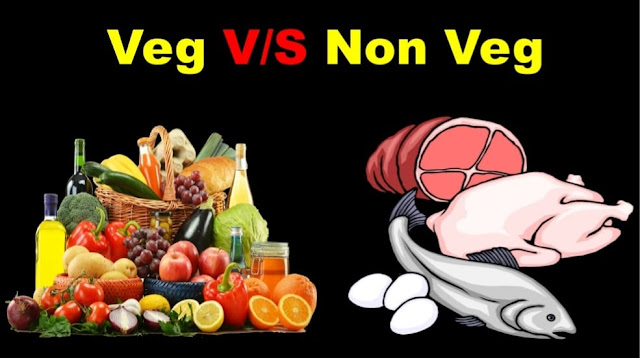There has been a hot debate, which has been going on for years and has been going back and forth about the shortage of vegetarians compared to non-vegetarian. This heated debate is accurate and baseless. Probably, that's why the whole reason is still controversial. In fact, if you look at the diet of both groups, you will be able to see the fact that there is room for healthy living in both groups. Here we have compared the benefits and disadvantages of vegetarian and non-vegetarian foods.
VEG
Vegetarian Foods - Advantages
- In a vegetarian diet, human diet is restricted to a wide range of plant-based foods along with milk and dairy products.
- People who eat vegetables are known to eat a small amount of protein, but do not suffer from problems with high protein diets, such as osteoporosis and kidney failure.
- Eating vegetarian food can help you achieve a healthy body weight.
- Vegetarian foods include high levels of antioxidants such as E&C vitamins and carotene, which are found in vegetables and fruits.
- A balanced veg diet is beneficial for all stages of life.
Vegetarian Foods - Disadvantages
- Vitamin B12 deficiency is common in vegetarians, as it is more common in meat, eggs, and fish. Vitamin B12 deficiency can produce unusual symptoms such as increased fatigue, shortness of breath, and temporary weight loss.
- Protein deficiency, as mentioned above, and iron and zinc deficiency are also common.
- Vegetarian diet may be insufficient for people that requires hard physical work.
NON - VEG
Non Vegetarian Foods - Advantages
- Non-vegetarian foods include all types of plant foods and by-products obtained from animals, such as chicken, fish, meat, etc.
- The animal proteins contain amino acids which ensures complete nourishment, that lacks in most of the plant based proteins.
- Vitamin B12 is high in levels as it is found in sources such as meat, eggs and fish. An adequate protein diet has never been a problem for non-vegetarians.
- Many animal products have rich source of calcium. Calcium is the most essential mineral for human bones and teeth.
Non Vegetarian Foods - Disadvantages
1. Meat products are loaded with saturated fat, which increases the risk of heart disease. Studies have shown that people who eat non-vegetarian foods:
- Keep their health short and they are at a risk of contracting chronic diseases.
- They like to develop diabetes, heart disease, and high blood pressure.
2. Digesting high amount of protein is a very difficult task for our digestive system, which can result into constipation and acidity.
Here are 5 great reasons why vegetarian diets are healthier than non-vegetarian diets.
1. A more balanced diet
Most non-vegetarian foods to choose from can give you high levels of protein, fat and omega 3 fatty acids, but does that make up for your healthy eating needs? Not at all! The human body needs a lot of nutrients in order to survive. Plant-based foods include whole grains, fruits, vegetables and pulses that are nutritious and low in saturated fat. Following a vegetarian diet helps you get all the essential nutrients and follow a lot nutritious food.
2. Low risk of heart disease
Vegetable foods are higher in fiber, vitamins, minerals and saturated fats. This keeps your blood pressure and cholesterol levels under control. In addition, regular consumption of such foods may reduce the risk of heart disease and stroke. To reduce the risk of cardiovascular disease, aim with foods high in fiber, potassium, and low-fat sodium.
3. Low risk of weight gain
Studies show that vegetarians eat more than non-vegetarians. They have a healthy BMI, controlled blood pressure and low cholesterol levels as well. Experts recommend that you eat only vegetables with a high body fat and weight loss. However, this depends on the type of food a person eats. If a vegetarian eats only junk food, it is unlikely that he will eventually lose weight. So it depends on the type of food you eat and how you meet your nutritional needs.
4. Longevity
People who eat vegetables are less likely to have high blood pressure, cholesterol, obesity, and other diseases caused by the use of saturated fats. In this way, they have a higher chance of living longer than people who do not eat meat. This, too, is subject to many factors. Specifically, the risk of premature death from heart disease is lower in vegetarians compared to non-vegetarians.
5. It is good to grind
Vegetable foods are high in fiber; non-vegetarian foods, on the other hand, are low in fiber. Therefore, the risk of digestive depression is higher if one eats meat-based foods. Plant-based foods, which contain grains, vegetables, fruits and legumes, are rich in dietary fiber. This keeps your digestive system working normally.


